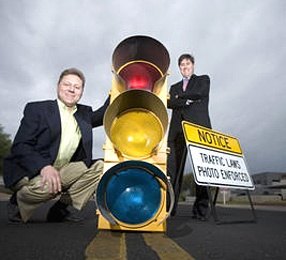Photo Enforcement Industry Launches All Out Florida Campaign
The industries that profit from photo enforcement are scrambling to convince Florida lawmakers to adopt legislation that will forgive municipalities for installing red light cameras contrary to existing state law. A circuit court judge last week ruled that red light cameras were illegal in the state, following the legal argument presented in a 2005 attorney general opinion. On the day the decision was handed down, an insurance and camera company-backed front group headed by Melissa Wandall, the widow of an accident victim, released new polling data intended to jump-start the legislative effort.
“These camera safety programs maintain that high degree of support across partisan, generational and gender lines as well,” Public Opinion Strategies (POS) partner Neil Newhouse claimed in the industry-supported press release. “Even a very healthy majority — 60 percent — of those who have personally received red light and speeding tickets still support using the cameras.”
The POS polling firm, which conducted the survey, has a contract with American Traffic Solutions to produce regular surveys in support of the ticketing company’s business model. The polling firm consistently produces favorable numbers that do not match the results seen at the ballot box. Photo ticketing has been put directly to voters in municipal elections on nine occasions ( view list). Photo ticketing has lost all nine contests with up to 86 percent of voters rejecting the industry’s arguments.
The industry has also made it a priority to undermine a 2008 review of the safety effects of red light cameras conducted by University of South Florida (USF) researchers ( view report). On the same day, a letter attacking the 2008 report by Edward A. Mierzejewski appeared in a suburban Chicago newspaper — the same letter, word-for-word, has appeared in the National Campaign to Stop Red Light Running’s photo ticketing company-funded newsletter. Although the 2008 report’s authors responded directly to the criticisms in a journal article ( view letter and response). Mierzejewski ignored the points made in rebuttal and used the same text published as a letter in a half-dozen Florida papers two full years ago.
The industry turned to Mierzejewski for good reason. As the administrator in charge of the USF Center for Urban Transportation Research, he is heavily involved in research supporting the use of toll roads. Tolling and photo enforcement are intimately linked, with American Traffic Solutions (ATS) serving as the leading provider of camera enforcement for toll roads. Mierzejewski maintains strong ties with the industry as he is the former program director for HDR Engineering, a company that worked closely with the ATS political operation in shutting down the 2008 congestion reduction initiative in Washington state that would have removed the profit motive from tolling and photo enforcement.
The Florida legislature will open the 2010 legislative session tomorrow.
[Courtesy: Thenewspaper.com]
More by The Newspaper
Latest Car Reviews
Read moreLatest Product Reviews
Read moreRecent Comments
- Kjhkjlhkjhkljh kljhjkhjklhkjh A prelude is a bad idea. There is already Acura with all the weird sport trims. This will not make back it's R&D money.
- Analoggrotto I don't see a red car here, how blazing stupid are you people?
- Redapple2 Love the wheels
- Redapple2 Good luck to them. They used to make great cars. 510. 240Z, Sentra SE-R. Maxima. Frontier.
- Joe65688619 Under Ghosn they went through the same short-term bottom-line thinking that GM did in the 80s/90s, and they have not recovered say, to their heyday in the 50s and 60s in terms of market share and innovation. Poor design decisions (a CVT in their front-wheel drive "4-Door Sports Car", model overlap in a poorly performing segment (they never needed the Altima AND the Maxima...what they needed was one vehicle with different drivetrain, including hybrid, to compete with the Accord/Camry, and decontenting their vehicles: My 2012 QX56 (I know, not a Nissan, but the same holds for the Armada) had power rear windows in the cargo area that could vent, a glass hatch on the back door that could be opened separate from the whole liftgate (in such a tall vehicle, kinda essential if you have it in a garage and want to load the trunk without having to open the garage door to make room for the lift gate), a nice driver's side folding armrest, and a few other quality-of-life details absent from my 2018 QX80. In a competitive market this attention to detai is can be the differentiator that sell cars. Now they are caught in the middle of the market, competing more with Hyundai and Kia and selling discounted vehicles near the same price points, but losing money on them. They invested also invested a lot in niche platforms. The Leaf was one of the first full EVs, but never really evolved. They misjudged the market - luxury EVs are selling, small budget models not so much. Variable compression engines offering little in terms of real-world power or tech, let a lot of complexity that is leading to higher failure rates. Aside from the Z and GT-R (low volume models), not much forced induction (whether your a fan or not, look at what Honda did with the CR-V and Acura RDX - same chassis, slap a turbo on it, make it nicer inside, and now you can sell it as a semi-premium brand with higher markup). That said, I do believe they retain the technical and engineering capability to do far better. About time management realized they need to make smarter investments and understand their markets better.


































Comments
Join the conversation
Yeah, POS's poll is a POS. There is no chance that 60% of us are in favor of this nonsense. This will self correct, I suspect. Given the amount of publicity being generated over all this, pretty soon many camera installations will suddenly become "inoperative". And after a few discrete pieces of black tape are appllied to a few license plate numbers, and a bunch of e-tickets are mistakenly issued to a bunch of wrong owners, the court cases are gonna pile up. I don't follow this much, but I don't understand how you can ticket the owner of a piece of property, and not a driver. Curious.
"Can you imagine if police officers were paid a bounty on each arrest?" We're close enough in places like Alabama (among others) where the Sheriff is paid a fixed amount per day per prisoner for food. No law says the Sheriff HAS to spend all the money on food. So they don't and claim the rest as personal income. Nothing illegal about it. One of the many police scandals in Missouri was STL city police selected towing firm wasn't releasing cars to their owners or claiming them lost. Of course the cops (and the Chief's daughter) had access to those 'lost', and/or were sold them. Took 10 years, but the FBI finally started an investigation... Red light cameras? Just another money grab by those in power. They always have and always will.